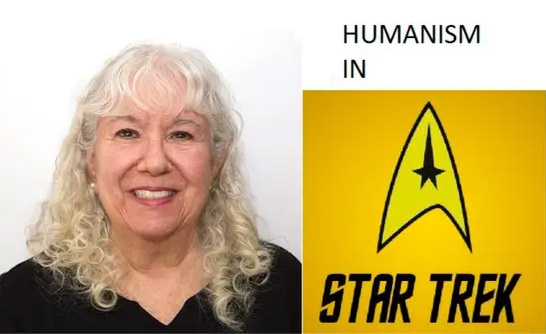On Sunday, February 27, Jefferson Humanists were pleased to have Susan Sackett speak on “The Humanism in Star Trek.” Sackett worked with Star Trek creator Gene Rodenberry for 18 years and served as his production assistant on the first Star Trek film and worked closely with him on the next five Star Trek movies. It was Roddenberry who introduced Sackett to Humanism.
Sacket used clips from both the original Star Trek and Star Trek: Next Generation to make points about Roddenberry’s use of Humanism as a theme in his stories, though transparent to people not familiar with Humanism.
In Sackett’s presentation and in the discussion that followed, several humanist themes were mentioned. One prominent one was related to the First Principle of Star Fleet, the “prime directive” – do not interfere with the development of other civilizations. Both clips that Sacket showed were from episodes where this principle was inadvertently violated, and the Star Fleet personnel were perceived as gods that controlled the local population. The main goal was convincing the locals that they were in control of their own future, could make their own decisions, and did not have to rely on a supreme power, even though the transition to self and community reliance might be difficult.
Another reoccurring humanist theme was equity among diverse people and populations, even artificial intelligence. Overcoming slavery, granting Data human status, showing women in leadership positions, a kiss between races – all challenged common opinions of the of the times. One early original episode showed two people whose expressed violent hate toward each other. On one the right side of his face was black and the left, white. On the other person, the right side was white and the left side black. The episode courageously showed the stupidly of racism – and in 1968. Sackett’s examples were clearly representative of humanist principles.
Sackett concluded her presentation with a quote from Roddenberry:
“Unless we have an educated populace, there’s no telling what may come along. The pressures of life are so great that a certain percentage of all these uneducated people will come up with strange ideas. Strange, violent ideas. They seem to have good answers for all our problems. I don’t think life’s problems are such that we have to rely on simplistic answers instead of thinking things through. I think these things will be found in proportion to and in reverse order of how well we educate the populace.”
Sackett’s presentation resulted in a very thoughtful discussion.





